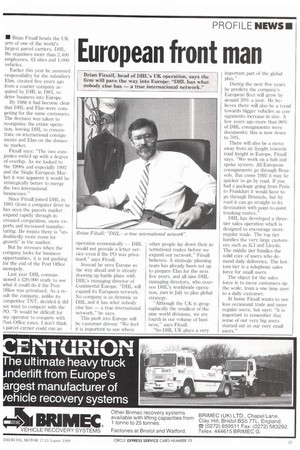European front man
Page 23

If you've noticed an error in this article please click here to report it so we can fix it.
• Brian Fitsall heads the UK arm of one of the world's largest parcel carriers, DHL. He organises more than 2,400 employees, 43 sites and 1,000 vehicles.
Earlier this year he assumed responsibility for the subsidiary Elan, created five years ago from a courier company acquired by DHL in 1981, to drive business into Europe.
By 1988 it had become clear that DHL and Elan were competing for the same customers. The decision was taken to reorganise the entire operation, leaving DHL to concentrate on international consignments and Elan on the domestic market.
Fitsall says: "The two companies ended up with a degree of overlap. As we looked to the 1990s and especially 1992 and the Single European Market it was apparent it would be strategically better to merge the two international businesses."
Since Fitsall joined DHL in 1981 (from a computer firm) he has seen the parcels market expand rapidly through increased competition, more exports and increased manufacturing. He insists there is "undoubtedly more room for growth" in the market.
But he stresses when the company looks for business opportunities, it is not pushing for the end of the Post Office monopoly.
Last year MIL commissioned a .220,000 study to see what it could do if the Post Office was privatised. As a result the company, unlike its competitor TNT, decided it did not want to compete with the PO. "It would be difficult for my operator to compete with Post Office rates. I don't think parcel carrier could run an operation economically — DHL would not provide a letter service even if the PO was privatised," says Fitsall.
Insiead he sees Europe as the way ahead and is already drawing up battle plans with DIIL's managing director of Continental Europe. "DHL will expand its European network. No company is as dynamic as DHL and it has what nobody else has — a true international network," he says.
This push into Europe will be customer driven: "We feel it is important to see where other people lay down their international routes before we expand our network," Fitsall believes. A strategic planning team has already been set up to prepare Elan for the next five years, and all nine DHL managing directors, who oversee DHL's worldwide operation, met in July to plan global strategy.
"Although the UK is geographically the smallest of the nine world divisions, we are fourth in our volume of business," says Fitsall.
"So DHL UK plays a very important part of the global plan."
During the next five years he predicts the company's European fleet will grow by around 20% a year. He believes there will also be a trend towards bigger vehicles as consignments increase in size. A few years ago more than 90% of DHL consignments were documents: this is now down to 70%.
There will also be a move away from air freight towards road freight in Europe, Fitsall says. "We work on a hub and spoke system. All European consignments go through Brussels. But come 1992 it may be quicker to go by road. If you had a package going from Paris to Frankfurt it would have to go through Brussels, but by road it can go straight to its destination with point-to-point trunking routes."
DHL has developed a threetier sales operation which is designed to encourage more regular trade. The top tier handles the very large customers such as ICI and Lloyds. The middle tier handles the solid core of users who demand daily deliveries. The bottom tier is a telephone sales force for small users.
The object for the sales force is to move customers up the scale, from a one time user to a daily customer.
At home Fitsall wants to see less occasional trade and more regular users, but says: "It is important to remember that some of our very big users started out as our very small users."




































































































